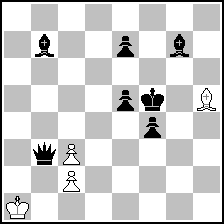|
|
| (1) Posted by Michael McDowell [Wednesday, Jan 13, 2021 21:43] |
Templar theme
In the latest issue of The Problemist there is a reference to "the Templar theme".
Can anyone enlighten me as to its origin?
|
|
| (2) Posted by Adrian Storisteanu [Wednesday, Jan 13, 2021 22:33] |
https://www.youtube.com/watch?v=lRlbmV39Zhw
|
|
| (3) Posted by Neal Turner [Thursday, Jan 14, 2021 17:19] |
Never heard of the Templar Theme, however there's also a reference to 'masked selfblocking', which I think is not quite correct.
A 'masked' effect is one in which the idea becomes evident after a move by the opponent* - in this case the selfblocking effect happens after a move of the queen's own king.
So maybe it should be referred to as 'anticipatory selfblocking'
*Encyclopedia page 272
Edit - I've just noticed the WB is guarding the blocking square - ok so it is White's move - unguarding the square - which affirms the blocking effect.
So 'masked selfblocking' is correct after all - sorry!
|
|
| (4) Posted by Geoff Foster [Thursday, Jan 14, 2021 23:34] |
Here is the problem.
Jozef Ložek
The Problemist 2021
 (= 4+7 ) (= 4+7 )
H#3 (b) Pc2>c4
(a) 1.Bf3 c4 2.Qe3 c3 3.Ke4 Bg6#
(b) 1.Bf6 c5 2.Qf7 c4 3.Ke6 Bg4#
Umnov effects and model mates in Meredith. W1 line openings. B2 masked selfblocking (Templar theme).
|
|
| (5) Posted by Hauke Reddmann [Friday, Jan 15, 2021 10:43] |
Chiming in (since that has potential for my usual
nomenclature-trolling, poor Wieland :-) -
"anticipatory" (D = voraus)
An effect is only completed by a later move of the same side
"masked" (D = maskiert)
An effect is only completed by a later move of the other side
Is that standard usage?
Must the effect be beneficial for that side? (If no, how are
negative later effects called then? Somehow, anticipatory
shooting one's own foot makes no sense, language-wise)
Hauke
|
|
| (6) Posted by Frank Richter [Friday, Jan 15, 2021 16:42] |
Looking at the h#3 could it be possible to say, that the blocks on f3/f7 are anticipatory AND masked:
"anticipatory" - the effect "block" is completed by a later move of the black king,
"masked" - the effect "block" is completed by a later move of the white bishop.
Of course the use of the term "masked" is quite unusual here, but why not?
|
|
| (7) Posted by Nikola Predrag [Friday, Jan 15, 2021 20:52] |
'Why not?'
Because it's improper. Of course, poetic metaphor about a single particular problem is OK, but as a general term it's wrong. Especially since the term is already used pretty properly.
|
|
| (8) Posted by Neal Turner [Saturday, Jan 16, 2021 12:47] |
I suppose what Nikola is talking about is that we're used to thinking of 'masking' as a line effect.
A piece's actions are 'masked' by some other piece sitting on the line which on moving away activates the first piece: 'masked interference', 'ambush' etc.
This was my view, but the entry in the encyclopaedia mentioned above generalises the concept:
MASKED FORM OF AN IDEA
A concealed form of an interpretation of an idea; the content of an idea may appear after one or more moves by the opponent.
Maybe it's debatable whether 'masked' is the right word here.
But's let's not forget the other things to debate in this problem:
"Umnov effects and model mates in Meredith"
Some might use the word 'presumptuous' to describe the way the helpmaters have taken over terms from other genres, and very often in the process distorted them.
So 'Meredith' should only be applied to direct two-movers, but that's a trivial gripe compared with what they've done with 'Umnov'.
Originally a paradoxical idea in three-movers, here it's giving its name to one of crudest ways to control the move order in helpmates.
Could it be the helpmaters taking their revenge on Mr Umnov who, it seems, had very little time for them?
|
|
| (9) Posted by seetharaman kalyan [Tuesday, Jan 19, 2021 07:57] |
Agree ... Umnov has no paradox in helpmates. It is surprising if white plays to a square just vacated by black in direct mates, but not so in helpmates.
|
|
| (10) Posted by Hauke Reddmann [Tuesday, Jan 19, 2021 11:12] |
"Paradox" is only a polite way to say "I'm too daft to understand it" :-)
(Note that "paradox"!="antinomy") A god-like being knows no paradoxa
(but then, it probably find no fun in solving chess problems :-).
Even in 2#, there must be a *reason* why capturing the black piece in the
first move fails, and self-block will be the most common one - I daresay
in h# it's the same. Case in point: Try to do a h#1 with Umnov effect,
no bP, no battery!
So why not simply use "Umnov" as shorthand for having to spell out
the effect and avoid any *default* artistic judgement? Noone hinders
you to say, say, "Oh, but it's a white pawn Umnow which is not really
impressive since it can't move there in the first place" *after* the
neutral description?
|
|
| (11) Posted by Jacques Rotenberg [Tuesday, Jan 19, 2021 11:21] |
"...Umnov has no paradox in helpmates..."
I don't completely agree : better perhaps would be "...Umnov may be less paradoxical in helpmates than in direct mates..."
You have some paradoxical Umnov in helpmates, and also you have some not paradoxical Umnov in direct mates
|
|
No more posts |
MatPlus.Net  Forum Forum  General General  Templar theme Templar theme |
 ISC 2024
ISC 2024 Forum
Forum  General
General  Templar theme
Templar theme 


